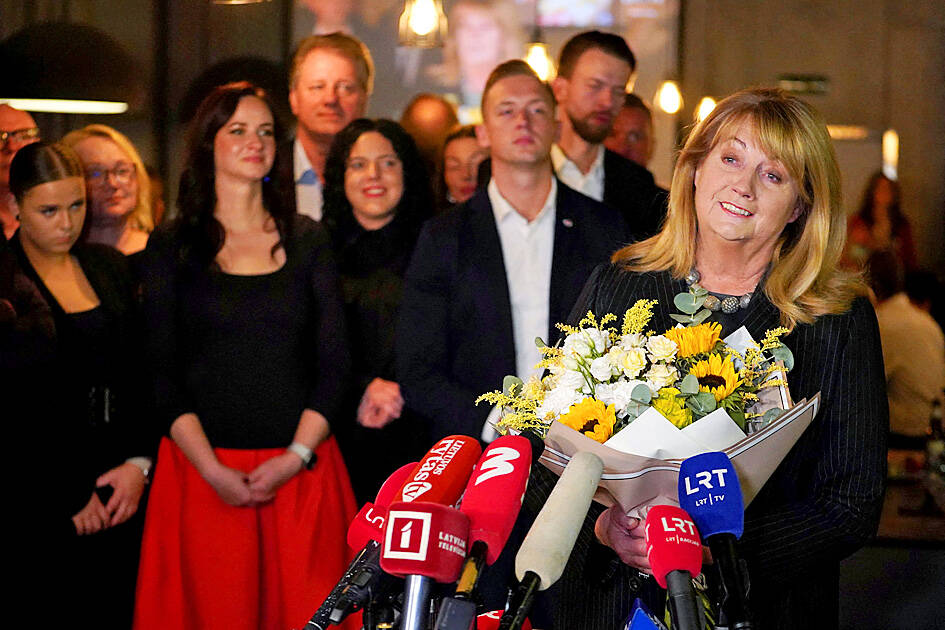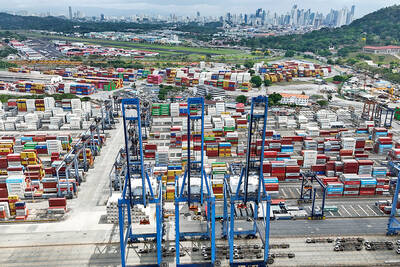Lithuania’s Social Democratic Party on Sunday won it first parliamentary elections in 12 years as voters turned to the opposition to address soaring disparities in the Baltic nation.
Social Democrats received 19.4 percent of the vote, putting the party in pole position to form the next government, with the ruling conservatives from the Homeland Union a close second at 18 percent, the final results showed.
The first round of voting showed the opposition has successfully tapped into rising discontent among the voters living outside relatively affluent cities like the capital, Vilnius, who have seen their incomes, pensions and social benefits eroded by a period of double-digit inflation.

Photo: Reuters
Income inequality in Lithuania, a country of 2.8 million wedged between Belarus and the Baltic Russian exclave of Kaliningrad, is the second-highest in the EU.
The anti-establishment mood has fueled the rise of an upstart party, the Dawn of Nemunas, whose leader is on trial for making anti-Semitic remarks in his criticism of Israel’s war in Gaza. The party came in third with 15 percent of the vote.
The Social Democrats have pledged to keep the Dawn of Nemunas under Remigijus Zemaitaitis out of potential coalition talks. However, his party might still emerge as a kingmaker, further complicating the Social Democrats’ task as it cobbles together a majority in a fragmented parliament. A total of six parties entered the legislature.
A return to power for the Social Democrats could see Vilija Blinkeviciute, a former social affairs minister, become the prime minister. Currently a lawmaker in the European Parliament, the 64-year-old is credited with raising pensions during her stint in government from 2000 to 2008.
Blinkeviciute said she sees her party building a ruling majority with two other center-left leaning partners of Union of Democrats “For Lithuania” and Lithuania’s Farmers and Greens.
Still, the plans might be complicated by personal animosity between the leaders of the two junior parties that vowed not to work together ahead of the election.
The shift in the political landscape should become clearer after Lithuanians return to choose the remaining half of the country’s legislators in a second round of elections on Oct. 27.
“We still have serious work to do in the second round and we hope for a truly good result,” Blinkeviciute said yesterday. “We hope that after consolidating results in the second round it will be enough to form a coalition of three parties.”
The change of guard is unlikely to affect Lithuania’s position as one of the most vocal critics of Russia’s war in Ukraine. Parties generally agree that the country needs to increase defense spending, currently at 3.2 percent of economic output, to prevent Moscow from potentially challenging NATO borders.
Conflicting demands might leave the next government with some hard fiscal choices. Low pensions and limited coverage of social benefits have driven up poverty and income inequality, the European Commission said in a June report.
The Social Democrats in power could also strengthen Lithuanian President Gitanas Nauseda, who was elected for a second term earlier this year and has had frosty relations with the Homeland Union leader, Lithuanian Minister of Foreign Affairs Gabrielius Landsbergis.

THE TRAGEDY OF PUNCH: Footage of the seven-month-old Japanese macaque has gone viral online after he was rejected by his mother and formed a bond with a soft toy A baby monkey in Japan has captured hearts around the world after videos of him being bullied by other monkeys and rejected by his mother went viral last week. Punch, a Japanese macaque, was born in July last year at Ichikawa City Zoo. He has drawn international attention after zookeepers gave him a stuffed orangutan toy after he was abandoned by his mother. Without maternal guidance to help him integrate, Punch has turned to the toy for comfort. He has been filmed multiple times being dragged and chased by older Japanese macaques inside the enclosure. Early clips showed him wandering alone with

Australian Prime Minister Anthony Albanese yesterday said he did not take his security for granted, after he was evacuated from his residence for several hours following a bomb threat sent to a Chinese dance group. Albanese was evacuated from his Canberra residence late on Tuesday following the threat, and returned a few hours later after nothing suspicious was found. The bomb scare was among several e-mails threatening Albanese sent to a representative of Shen Yun, a classical Chinese dance troupe banned in China that is due to perform in Australia this month, a spokesperson for the group said in a statement. The e-mail

‘OCCUPATION’: Hong Kong said it had lodged ‘stern protests’ with Panama’s consulate, and would ‘staunchly support’ the rights and interests of Hong Kong companies Panamanian President Jose Raul Mulino on Monday ordered the temporary occupation of two ports run by a unit of CK Hutchison Holdings Ltd following the Supreme Court’s ruling against the firm’s concession, escalating a dispute that has become a proxy battle between the US and China in Latin America. Mulino said in a speech that the administration and operation of the two ports on the strategic Panama Canal is to revert to the country’s National Maritime Authority to ensure their uninterrupted, safe and efficient operation. The occupation covers movable equipment at the ports and does not mean a definitive loss of

GAME CHANGER The Russian invasion of Ukraine has shown the utility of small drones for recon, for supporting logistics and for killing across the modern battlefield Five European nations have announced a new program to produce low-cost air defense systems and autonomous drones using Ukrainian expertise, hard-won over the past four years fighting against Russia. Friday’s initiative of the five nations — France, Poland, Germany, the UK and Italy — comes as one of many European efforts to bolster defense along their borders, like a “drone wall ” with Russia and Ukraine to better detect, track and intercept drones violating Europe’s airspace. Both Moscow and Kyiv have cutting-edge drone warfare capabilities forged in the grim laboratory of war where battlefield innovations have rewritten modern battle tactics. Poland is